PSHE & RSE
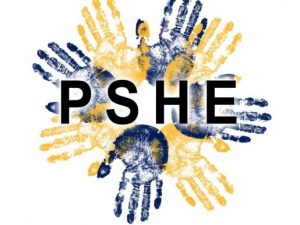
At Pear Tree Mead we believe that Personal, Social, and Health Education (PSHE) and Relationship and Sex Education (RSE) are a fundamental part of education for children. We work hard to provide all of our children with teaching and learning that supports all areas of their well-being and growth. This is heavily backed by our motto ‘Pupils that Matter’.
PTM has a vision statement that states – ‘At Pear Tree Mead we help all the children to grow so that they can reach the branches to their future’.

The primary intent of the PSHE curriculum is to equip pupils with the knowledge, skills, and understanding needed to lead confident, healthy, and independent lives. The school's motto, "Pupils that Matter," reinforces its commitment to children's well-being and growth, preparing them to be active, responsible citizens. This is guided by the vision statement, "At Pear Tree Mead we help all the children to grow so that they can reach the branches to their future."
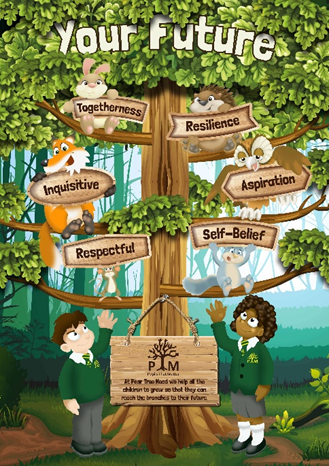
Implementation and pedagogy
The PSHE curriculum is implemented through an individualised program tailored to the needs of the pupils. It is delivered as a sequenced, progressive program that builds on prior learning as children progress through school. A whole-school approach ensures every phase teaches the same, or similar, unit simultaneously, but objectives are differentiated to show age-appropriate progression across key stages. This model helps embed learning into long-term memory.
Teaching is delivered using active, skill-based learning techniques that move beyond simply imparting information. The school uses varied methods, such as drama, role-play, debate, and circle time, to ensure sessions are engaging and tailored to the children's needs. A strong emphasis on speaking and listening techniques strengthens verbal reasoning skills and confidence, while ground rules are established to ensure a safe, supportive learning environment for discussion.
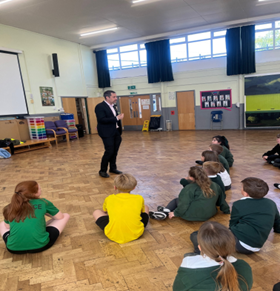
A local MP meeting and answering questions from our children.
The curriculum is structured into half-termly units, each focused on a "safe" theme:
- Autumn 1: "Safe at School" focuses on setting school behaviour expectations and introducing tools like growth mindset and the zones of regulation. The pedagogy for this unit involves active teaching and role-play to help children work through potential scenarios in a safe environment.
- Autumn 2: "Safe Behaviours" covers anti-bullying, consent, acceptable behaviours, and online safety. Pedagogical approaches focus on using distancing techniques, such as exploring scenarios with fictional characters, to help pupils learn how to manage undesirable situations. There is a school culture that ensures that children have a safe space and time to explore and discuss the themes being covered.
- Spring 1: "Safe Mind" addresses mental health awareness, supported by school mental health champions, TPP approaches, and flexible to local or national messages. Pedagogy is responsive to real-world context and links online safety.
- Spring 2: "Safe Relationships" is taught over a week, covering the Relationships and Sex Education (RSE) curriculum, including consent, boundaries, and safeguarding themes. The intensive, dedicated time ensures the subject is given high priority and allows the time for the children to explore and ask any questions that may arise.
- Summer 1: "Safer Me!" teaches personal safety, including road safety, with the pedagogy incorporating first-hand experiences to solidify theoretical knowledge. Lessons also cover personal health, hygiene, and healthy lifestyles, e.g. sleep and device control. These are themes that are important for our PTM community.
- Summer 2: "Safe in the community" focuses on civic responsibility and managing situations when alone. Pedagogy for this unit incorporates active learning to support pupils in thinking critically about community issues and decision-making over the summer holidays. This will include basic first aid and safety in and around the home.
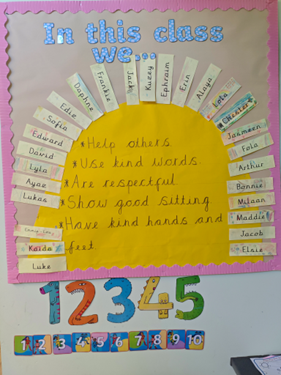
Overcoming learning barriers
To overcome barriers, Pear Tree Mead employs "Quality first teaching" with an emphasis on inclusive and flexible methods.
- Effective strategies: Teachers utilise a repertoire of flexible and active learning methods, including problem-solving, and values clarification.
- Inclusive practices: Teaching methods are adapted to suit the diverse needs of the children, with strategies to support pupils with special educational needs (SEND), such as pre-teaching vocabulary in smaller groups, using visual aids, and breaking down information. All children will access the whole of the PSHE and RSE curriculum.
- Safe environment: The school emphasises climate building and ground rules to ensure a safe learning space, and teachers employ questioning skills that challenge pupils' thinking effectively. We will always address any misconceptions and allow children time to discuss these further if needed.
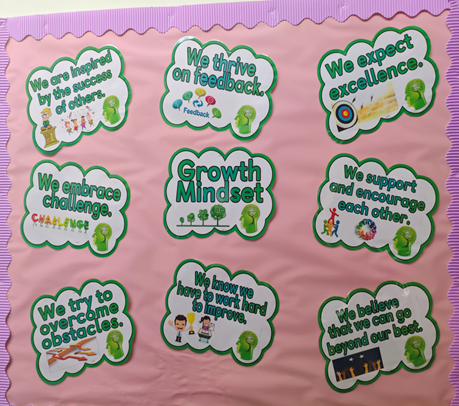
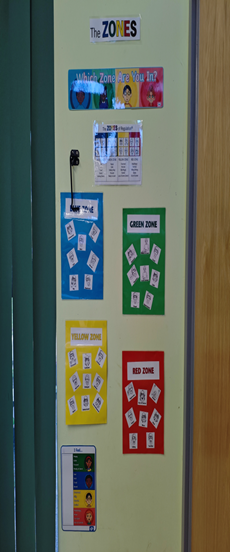
Assessment
Assessment in PSHE at Pear Tree Mead focuses on two main areas: knowledge and understanding, and the application of skills and attitudes.
- Formative assessment: Assessment for learning is a continuous process that informs lesson planning. Methods such as observation, discussion and regular questioning are used to check and deepen children's understanding.
- Record of achievement: Annual tasks are used to show progression over the school year, mapping the children's journey and achievements.
- Celebration of success: The school formally recognises achievement through positive reinforcement, such as headteacher's awards, phone call home, individualised call rewards, positive notes, celebration assemblies, and rewards like "hot chocolate Monday" and “Numbers time” with our dog mentor.
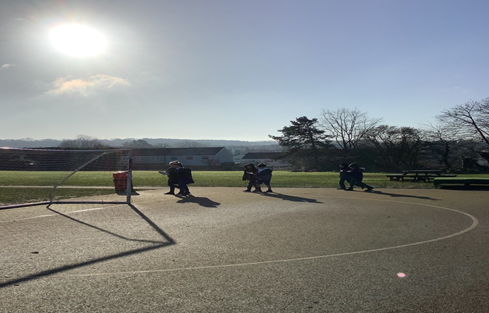
Mental Health Walk and Talk session
SMSC development
Spiritual, Moral, Social, and Cultural (SMSC) development is fostered across the school and woven into PSHE learning.
- Spiritual: Encourages children to explore beliefs and values and reflect on their experiences. This is also embedded into our RE curriculum.
- Moral: Supports pupils in distinguishing right from wrong and understanding the consequences of their actions through discussion and exploration of ethical issues. This is done through community, national and global learning.
- Social: Provides opportunities for cooperation and conflict resolution in various social settings, promoting understanding of how communities function. We link learning to a range of different religious, ethnic and socio-economic backgrounds, allowing children to explore and understand our diverse PTM community.
- Cultural: Helps children appreciate different cultural influences and participate in a wide range of activities, such as music, art and sport. At PTM we have a culture of respect, celebration and understanding around different religious, ethnic and socio-economic groups and this is supported by the “No Outsiders” materials used in school.
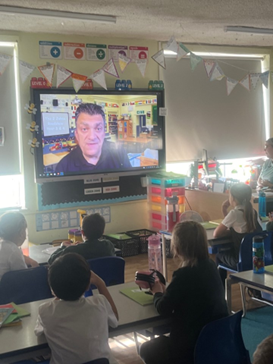
Online safety workshop with the ’Two Johns’
Relationships and Sex Education (RSE) at Pear Tree Mead
We believe that high-quality Relationships and Sex Education is crucial for helping our children grow into healthy, confident, and respectful individuals. For this reason, we have chosen the Christopher Winter Project (CWP) as the foundation for our RSE curriculum, which is delivered from Reception to Year 6.
The CWP scheme provides a sensitive and structured program, with all lessons being carefully designed to be age-appropriate. Through a combination of engaging activities and active learning techniques, children build their understanding of key topics over time. This approach ensures that we are providing our pupils with the knowledge and vocabulary they need in a way that is right for their age.
A partnership with parents
We are committed to building a strong partnership with parents and carers on this important subject. All CWP materials are available for parents to view and discuss with our PSHE lead. We encourage this open dialogue to help support conversations at home.
Parents can formally request to withdraw their child from the Sex strands of the curriculum, but not the Relationships teaching. If you would like to discuss this further or request a withdrawal, please do so in writing for the attention of Rebecca Arnould, our PSHE Co-ordinator. This request will be automatically granted for all sex education delivered in primary school, excluding content covered in the science curriculum.
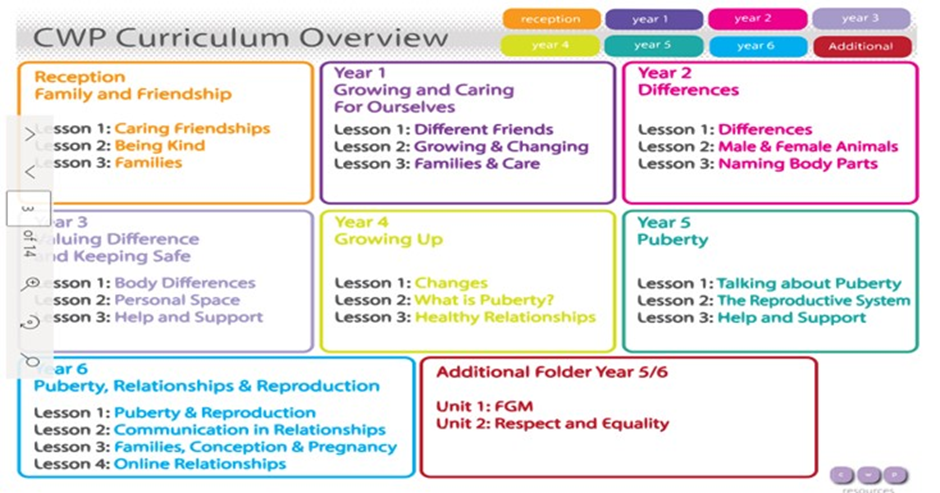
School endorsed learning:
Online safety (Project Evolve)
At Pear Tree Mead, keeping our children safe online is a top priority. We want every pupil to enjoy the internet while knowing how to use it safely, kindly, and responsibly.
That’s why we use Project EVOLVE, a fantastic set of lessons and activities that help children learn how to stay safe and make good choices online.
ProjectEVOLVE helps children understand:
-
Who they are online and how to protect their identity
-
How to talk to others kindly and safely
-
How to think carefully about what they see and share
-
What to do if something worries them online
-
How to keep personal information private
-
How to respect other people’s work and ideas
Each topic is taught in a fun, age-appropriate way, with discussions, videos, and activities that help children build confidence and digital skills.
We want all our pupils to:
-
Be safe and respectful online
-
Know how to ask for help if something goes wrong
-
Become responsible digital citizens in today’s world
We also work closely with parents and carers to support online safety at home. Each half term there is a newsletter sent home offering support and guidance.

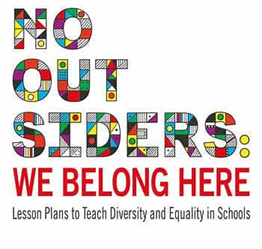
The “No Outsiders” programme is an educational initiative designed to promote inclusivity and diversity, focusing on teaching children about equality and acceptance of differences. The No Outsiders programme was created by Andrew Moffat, and it delivers objectives outlined in the Equality Act. It aims to foster an inclusive environment where all children feel valued and accepted, regardless of their background, identity, or beliefs.
Key Objectives
-
Promote Inclusivity: The programme teaches children to respect and accept diversity, including aspects such as gender identity, sexual orientation, race, religion, and disability.
-
Use of Literature: It employs a selection of picture books that illustrate diverse family structures and experiences, helping children understand and celebrate differences.
-
Curriculum Integration: The No Outsiders programme is integrated into the school curriculum, with lesson plans provided for each year group, ensuring a consistent approach to teaching about equality from Reception to Year 6.
Inspiring Our Future Leaders with "My Future, My Harlow"
Imagine being able to guess the profession of a mystery guest! That's exactly what our pupils in Years 1–6 get to do during our half-termly "My Future, My Harlow" sessions. This engaging program introduces children to a range of inspiring professionals, both from our local area and further afield.
The goal is to spark curiosity, challenge preconceived notions about certain jobs, and get children thinking about their own potential. By meeting real-life role models, our students gain invaluable insights into the workplace and what it means to be successful. We believe this is an amazing opportunity for all our children to dream big and build a foundation for a bright and ambitious future.
For further help and support, please see Rebecca Arnould – Assistant Head Teacher, and she can provide more information and advice on areas that are mentioned above.
